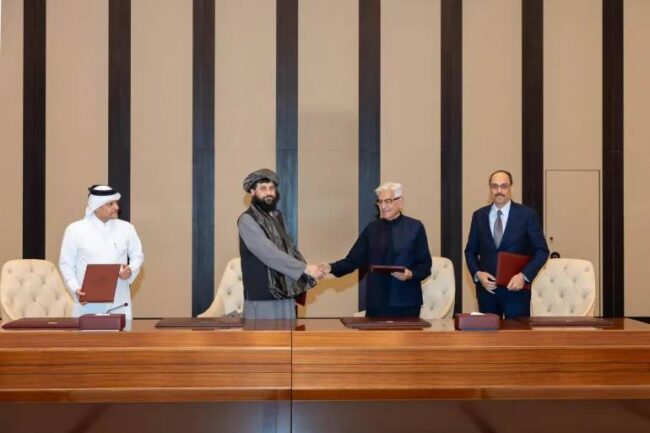
Pakistan and Afghanistan Agree to New Ceasefire Following Over a Week of Deadly Border Clashes 19/10/2025
Pakistan and Afghanistan Agree to New Ceasefire
Pakistan and Afghanistan Resolve to Immediate Ceasefire After Doha Peace Negotiations
Pakistan and Afghanistan agreed to an immediate ceasefire on October 19, 2025, following high-level peace talks conducted in Doha, Qatar. The negotiations, sponsored by Qatar and Turkey, came following a week of intense border fighting—the worst the two neighbors had seen since the Taliban took over Kabul in 2021.
The ceasefire deal was announced by Pakistan’s Defence Minister Khawaja Muhammad Asif on X (ex-Twitter), confirming that the two sides would meet again on October 25 in Istanbul to finalize more details and guarantee the sustainability and enforcement of the ceasefire. The Afghan Defence Minister Mullah Mohammad Yaqoob Mujahid was also involved in the talks.
Taliban spokeman Zabihullah Mujahid stressed that the parties reached a full and substantive ceasefire, assuring that the two nations would not pursue aggressive actions against each other nor back groups launching attacks against Pakistan.

The skirmishes broke out after Pakistan’s calls for Kabul to rein in militant groups based on Afghan soil and launching attacks within Pakistan. Islamabad accused Afghanistan of harboring these militants in safe havens, which was vehemently denied by the Taliban. The Taliban in turn blamed the Pakistani military for disinformation and harboring Islamic State-affiliated militants with a goal of destabilizing Afghanistan. These accusations are denied by Pakistan.
The latest violence involved ground combat and Pakistani air raids along the 2,600-kilometer border the two countries share, causing dozens of deaths and hundreds of injuries. Among the most prominent of these incidents was a suicide bombing along the border on October 17, which killed seven Pakistani soldiers and injured thirteen more.

Pakistan’s Army Chief Field Marshal Asim Munir said that the Afghan government should reign in proxy militant groups using the Afghan territory to attack Pakistan.
In spite of the ceasefire, Afghan authorities reported that Pakistan carried out airstrikes against civilians in Afghanistan just after the ceasefire extension on October 17. Kabul kept the option open to retaliate but asked its fighters to refrain from retaliation to respect the peace talks.
The conflict also touched relations at the sporting level, with Afghanistan pulling out of a scheduled Twenty20 cricket tri-series in Pakistan after the killing of three Afghan cricketers, blaming the killings on Pakistani military bombings in Paktika province.
Pakistan’s Information Minister, Attaullah Tarar, justified the airstrikes as being against confirmed militant camps and dismissed civilian casualties. He also claimed that militants attempted to carry out attacks during the ceasefire, and Pakistani forces killed more than 100 militants, including those who carried out the recent suicide bombing.
The deal marks a milestone towards alleviating long-standing tensions between Pakistan and Afghanistan, with future negotiations set to ensure the ceasefire holds and to tackle the issues propelling conflict between the two nations.
